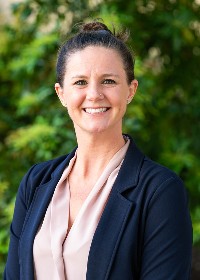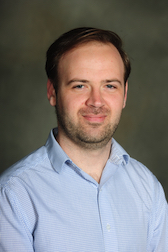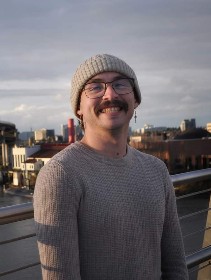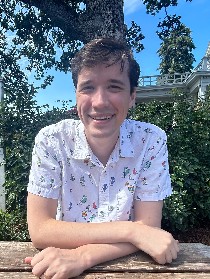Multidisciplinary Research Training in Pulmonary Medicine (NHLBI T32)
Program Overview
The PACCM T32 Research Training Program offers state of the art, multidisciplinary research training for predoctoral and postdoctoral trainees conducting research related to pulmonary medicine. We provide one to two years of stipend and tuition support with funding from the National Heart, Lung, and Blood Institute. The T32 offers a broad array of opportunities, encompassing Bench (Molecular/Cellular Biology/Physiology/Immunology), Epidemiology/Outcomes (Cancer Screening/Critical Care Medicine/Bioinformatics), and Translational Medicine (Critical Care/Diagnostics/Bioinformatics). Research mentorship is provided by faculty scientists with wide-ranging research interests and extensive experience in training young scientists. Interactions and synergy among the laboratories and research groups in this program add to the rich and broad training environment. Trainee development is further supported by research seminars, and formal coursework designed to enhance cross-disciplinary skills that extend beyond the scope of an individual project. Our overarching mission is to develop the next generation of scientific leaders in respiratory medicine.
Our program solicits applications twice per year, in October (postdocs round 1) and March (predocs and postdocs round 2). Applicants are notified in January and May. We appoint three graduate students and three postdocs per year.
Applications for the T32 are currently closed.
Applicants must be NIH training grant eligible (US citizen or green card holder). Candidates should submit the following application items to the T32 administrator:
- NIH-formatted biosketch
- Career Vision Statement: comment on how this training opportunity would fit into overall trajectory in relation to career goals in Pulmonary medicine (2-3 paragraphs)
- Research proposal/experimental plan (1-2 pages, excluding references)
- Project narrative (2-3 sentences describing the relevance of the research to public health)
- Biosketch and letter of support from mentor(s) (contact program administrator for details on expected elements)
Candidates selected by the Executive Committee will be interviewed, with their mentor(s), by the program directors and administrator.
Perspectives in Pulmonary Medicine is a dedicated T32 seminar course that provides trainees and other interested participants with an understanding of pulmonary physiology and pathology, and specifically focuses on research methodologies. The course consists of a series of ten sessions over a two-year period, covering physiology and special topics such as lung cancer, infection, airway disease, and lung injury.
Pulmonary Research Conference is a weekly in-person gathering where T32 trainees and faculty mentors, PACCM faculty and fellows, and other members of the pulmonary research community present recent findings and work in progress. The meeting is held on Wednesdays at 11:00, in LBRB 381. Contact: Dr. Elly Karamooz
Pulmonary T32 Mentoring Lunch is an opportunity for trainees to get exposure to a diversity of career paths related to biomedical research. Mentoring lunches are held three times per year, and each meeting features one or two guests who describe their career trajectory, answer questions, and advise trainees.
Publication Records of Selected Pulmonary T32 Alumni
Pulmonary T32 Leadership


T32 Executive Committee
Matthew Drake, MD
Allison Fryer, PhD
Sherie Gause, MD
David Lewinsohn, MD, PhD
Miranda Lim, MD, PhD
Christopher Slatore, MD, MS
Kelly Vranas, MD, MCR
2025-2026 T32 Trainees

Dr. Brooke Shafer is a second-year post-doctoral researcher in the Sleep, Chronobiology, and Health Laboratory in the School of Nursing at OHSU. She is co-mentored by Dr. Andrew McHill and Dr. Steven Shea. She is applying her research background in autonomic neural control of the vasculature to investigate how the mistiming of behaviors (i.e., sleeping, eating, activity) with our internal biological timing system may increase the risk of cardiovascular disease. The T32 has provided her the training opportunity to learn about the interactive effects between diet and the human circadian system on cardiovascular and metabolic health outcomes.

Kayla is a fourth-year PBMS Graduate Student in the OHSU Asthma Lab under the primary mentorship of Dr. Jane Nie. Her research is focused on the development of asthma characteristics in offspring born to obese mothers. She uses a mouse model of diet-indued maternal obesity to investigate changes in metabolic function, airway epithelial sensory innervation, and airway responsiveness in their offspring and how these phenotypes present throughout their lives. Kayla is excited to build lifelong connections with the OHSU PCCM through the T32 and gain further insights on current/future research initiatives. Most importantly, she is excited to enter a community where she can explore many different respiratory research initiatives that may influence her future research passions!

Dr. James Kornfield is a Pulmonary and Critical Care physician working with Dr. Matthew Drake in the OHSU Asthma Lab. He completed his Internal Medicine Residency and Pulmonary and Critical Care Fellowship at OHSU and is continuing his research on the Pulmonary T32. During his post doctoral fellowship he will further his work on understanding the interplay of airway mucins and respiratory viruses in the development of asthma. He hopes the T32 will help provide the means to launch a career as a physician scientist with dedicated time to incorporate new techniques, develop excellent mentorship and attempt to bridge the gap between experimental results and patient care.

Joyce Se-Jin Kim is a fourth-year graduate student in the Program in Biomedical Sciences and MD/PhD Training Program. She is completing her thesis in Dr. David Lewinsohn’s lab in the Department of Molecular Microbiology and Immunology. Joyce is studying the role of calcium sensors in intracellular trafficking and antigen presentation of Mycobacterium tuberculosis. The PACCM T32 training grant will help Joyce to pursue advanced research, receive mentorship from faculty members, and develop collaborations with multidisciplinary fields.

Ubaldo De La Torre is a sixth-year PBMS Graduate Student in the OHSU Asthma Lab under the primary guidance of Dr. Matt Drake. His current research focus emphasizes lung development in offspring born from eosinophilic asthmatic mothers. Specifically, he is using an eosinophilic mouse model to investigate the effects of maternal allergen exposure during pregnancy on offspring development with attention to how these maternal-fetal interactions affect airway parasympathetic nerve architecture and function. Through the T32, he hopes to further bridge his understanding of basic and clinical respiratory science while building a network of collaborators.

Dr. Thaddeus Kunkel is a third-year postdoctoral fellow in the Pediatrics Department. He is co-mentored by Drs. Manideep Chavali and Ben Emery. His research investigates the mechanisms underlying neurological impairment after hypoxic injury. The PCCM T32 allows Dr. Kunkel to build a network of multidisciplinary collaborators while increasing his understanding of the interplay between the pulmonary and central nervous systems.